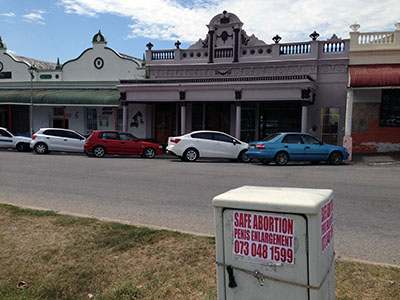
Almost exactly three weeks ago, women attending a Cape Town reproductive clinic found themselves running an unexpected gauntlet. Instead of walking through the doors and waiting in line with their appointment cards, women requiring contraception, advice – and some seeking to terminate a pregnancy – had to make their way through a crowd of angry protesters holding placards and Bibles. At the sight of a nurse appearing from inside the clinic the crowd became more animated. “Murderer!” they shouted in unison. (Green, Amy (2015). Moral crusade condemns SA women to die. Mail & Guardian, 30 June 2015)
So, American-style ‘pro-life’ politics have finally made their way to South African shores. Oh damn! We have very liberal abortion legislation in South Africa, including that women may request an abortion up to 12 weeks of gestation, that abortion may be performed under certain, quite lenient, circumstances thereafter and up to 20 weeks, that minors do not need the consent of their parents/guardian to have an abortion, and that the state provides termination of pregnancy services. The passing of this legislation was not without its controversies: gender and reproductive health rights activists had to lobby hard to ensure that the Choice on Termination of Pregnancy Act was passed in 1996.
Despite our liberal laws, abortion continues to be highly stigmatized in South Africa. Women will not talk openly about having a termination of pregnancy, and face harsh treatment at the hands of service providers in public clinics when asking about the services. Few nurses volunteer to be termination of pregnancy health service providers and only 57% of designated facilities are operating at last count.
What we have avoided up to now, however, is the kind of scene described in the paragraph above. Stigma has operated in subtle ways, in interpersonal interactions and in small social spaces. The ‘running the gauntlet’ scenes that are so common in the United States, and more recently in the UK, have been, for the most part, absent in South Africa.
We should, I think, be worried, very worried about this development. The importation of conservative American-style sexual and reproductive politics is very dangerous, especially where there is fertile ground for sowing the seeds of discontent. Look at what happened in Uganda. The Ugandan Anti-Homosexuality Act of 2014 allows for life imprisonment for same-sex relations and for penalties for individuals, companies, media, and NGOs who know or support LGBT people. It is widely acknowledged that the impetus for the promulgation of this legislation was facilitated by three evangelical American Christians who visited Uganda and who asserted in conferences that homosexuality is a direct threat to the cohesion of African families.
What makes the importation of American-style conservative sexual and reproductive politics especially dangerous is the confluence of interests that it finds amongst conservative patriarchal Africanist perspectives that, for example, claim that same-sex relations and abortion are colonialist imports, and that skewed gendered relations are the natural order of things. The combination of the two types of politics is hard to oppose.
Gender and reproductive health activists in South Africa need to pay especial heed to these recent developments. We need to be pro-active in opposing the importation of conservative American style ‘pro-life’ politics and we need to be mindful of the gains that these politics have made in restricting access to abortion in America (a steady erosion of abortion rights has taken place in the USA over the last decade, despite Roe vs Wade not being overturned). We cannot allow that gains made in having the CTOP Act passed to be slowly chipped away at.
Catriona Macleod
February 2015
